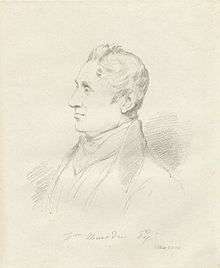William Marsden (orientalist)
William Marsden FRS (16 November 1754 – 6 October 1836) was an Irish orientalist, linguist, numismatist, and pioneer in the scientific study of Indonesia, serving as first secretary of the Admiralty during years of conflict with France. In 1805, Marsden received the bittersweet news of victory in the Battle of Trafalgar and of the death of Admiral Horatio Nelson in the battle.

Early life
Marsden was the son of a Dublin merchant. He was born in Verval, County Wicklow,[1] and educated at Trinity College, Dublin. Upon obtaining a civil service appointment with the East India Company at sixteen years of age, he was sent to Benkulen, Sumatra, in 1771. He was promoted to the position of principal secretary to the government, and acquired a knowledge of the Malay language and the country. After returning to England in 1779, he was awarded the Doctor of Civil Law (D.C.L.) degree by Oxford University in 1780[2] and published his History of Sumatra in (1783).
Marsden was elected to membership in the Royal Society in 1783. He had been recommended by James Rennell, Edward Whitaker Gray, John Topham, Alexander Dalrymple, and Charles Blagden.[3]
Admiralty secretary
In 1795, Marsden was appointed second secretary to the admiralty, later rising to the position of first secretary with a salary of £4,000 per annum. It was in this capacity in 1805 that he received the news of victory in the Battle of Trafalgar and of the death of Admiral Horatio Nelson in the battle. As first secretary he suggested the Marsden squares system for arranging and grouping information over the oceans. He retired in 1807 with a lifetime pension of £1,500 per annum which he subsequently relinquished in 1831. In 1812, he published Grammar and Dictionary of the Malay Language.[4] This was followed by a translation of the Travels of Marco Polo in 1818.
Marsden was a member of many learned societies, and treasurer[5] and vice-president of the Royal Society. In 1834 he presented his collection of oriental coins to the British Museum and his library of books and Oriental manuscripts to King's College London.[6] His other works are Catalogue of Dictionaries, Vocabularies, Grammars and Alphabets (1796), Numismata orientalia (London, 1823–1825), and several papers on Eastern topics in the Philosophical Transactions and the Archaeologia.
Marsden's Numismata orientalia opened the field for Asian numismatics in Western languages, and was a "bible" for the subject, so much so that a new edition was planned in 1870s, but the field had grown so much by then that the new series was soon renamed as the International Numismata Orientalia.
He married Elizabeth, the daughter of his friend Sir Charles Wilkins FRS, but there was no issue to this marriage. He died on 6 October 1836 from an apoplexy attack and was buried at Kensal Green Cemetery. He left his estate to his kinsman Rev. Canon John Howard Marsden. Elizabeth subsequently married Colonel William Leake FRS on 17 September 1838.
Selected works
- 1784 – The history of Sumatra: containing an account of the government, laws, customs and manners of the native inhabitants, with a description of the natural productions, and a relation of the ancient political state of that island. London: Printed for the author. OCLC 3792458
- 1802 – "Observations on the language of Siwah; in a letter to the Rt. Hon. Sir Joseph Banks; by William Marsden, Esq., F.R.S." in The Journal of Frederick Horneman's Travels: From Cairo to Mourzouk, the Capital of the Kingdom of Fezzan, in Africa, by Friedrich Hornemann, James Rennell, William Marsden and William Young. London: G. and W. Nicol. OCLC 5165766
- 1796 – Catalogue of Dictionaries, Vocabularies, Grammars and Alphabets
- 1812 – Grammar and Dictionary of the Malay Language single edition, Dutch & French translation of the Grammar (C. P. J. Elout based on Marsden), Dutch-Malay & French-Malay Dictionary (C. P. J. Elout based on Marsden)
- 1818 – Travels of Marco Polo[7]
- 1823 – Numismata orientalia
- 1830 – Memoirs of a Malayan Family by 'La-uddı̄n Nakhoda Muda (translated by William Marsden). London: Oriental Translation Fund of Great Britain and Ireland. OCLC 5347657
Notes
- "Wm. Marsden, Esq., D.C.L., F.R.S.", The Gentleman's Magazine, VII (Feb. 1837), p. 212.
- C.E. Buckland, Dictionary of Indian Biography, London, Swan Sonnenschein (1906), p. 273.
- The Royal Society, Archives, Ref. No. EC/1782/10.
- A copy of Grammar and Dictionary of the Malay Language PDF from Google.
- "Proceedings of Learned Societies," Philosophical Magazine. Vol. XXV (1806). p. 267.
- http://www.kcl.ac.uk/library/archivespec/special-collections/individualcollections/marsden.aspx
- "Review of The Travels of Marco Polo ... translated from the Italian, with notes, by William Marsden ..." The Quarterly Review. 21: 177–195. January 1819.
- IPNI. Marsden.
References
- Marsden, William. (1838). Brief Memoir of the Life and Writings of the Late William Marsden. London: Cox. OCLC 18750067
- Chisholm, Hugh, ed. (1911). . Encyclopædia Britannica. 17 (11th ed.). Cambridge University Press. p. 766.